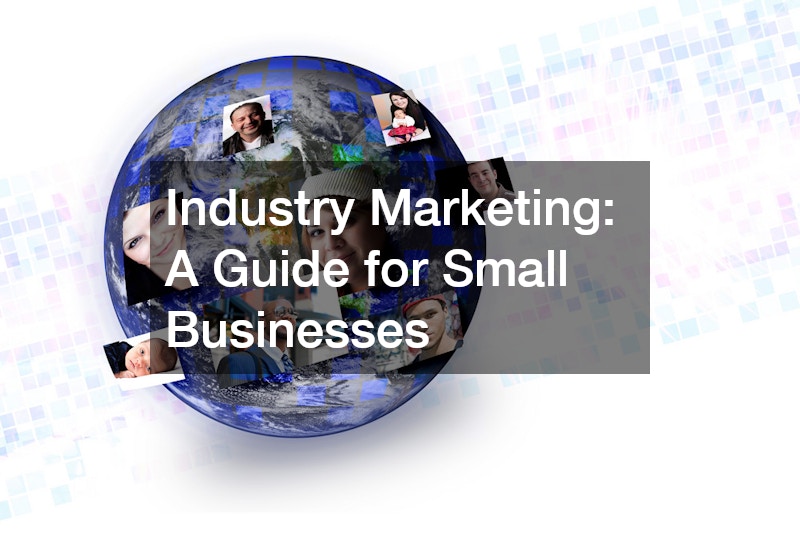Small businesses are faced with unique challenges when it comes to establishing and maintaining their market presence in today’s highly competitive business environment. Small businesses, unlike larger corporations that have dedicated marketing teams and vast resources, must strategize carefully to maximize their impact and reach within their industry. Small businesses can use industry marketing to reach their target audience, create a recognizable brand, and grow.
Understanding the fundamentals behind industry marketing will help small businesses leverage the tools and strategies necessary to compete in their own market. A well-rounded marketing strategy is crucial to success in any business, whether it be through social media, digital marketing, or traditional advertising.
Small businesses can benefit from industry marketing. It’s not only about spreading the word but also about creating a message that resonates with specific audiences within a certain industry. Small businesses can stand out from the crowd in a crowded market by using a targeted marketing approach. This will ensure that their efforts are efficient and effective. Small businesses can create lasting relationships with their customers by focusing on their unique industry.
Understanding the Basics of Industry Marketing
Marketing efforts are tailored to a particular industry or sector. Understanding the basics of marketing for industries is important to small businesses in order to develop a strategy aligned with their target audience’s needs and expectations. This involves researching industry trends and analyzing your competitors. It also includes identifying key drivers in consumer behavior.
Small businesses can create marketing messages that are relevant and compelling by gaining a deeper understanding of these elements. Industry marketing involves selecting the best channels to reach customers, be it through digital platforms or trade shows.
In order to market a window-cleaning company or any other small business, it is important to understand the needs and preferences specific customers have within the cleaning industry. It may be necessary to research the types of buildings most likely to require window cleaning on a regular basis, identify the peak cleaning seasons, and understand the challenges faced by commercial clients. Window cleaning companies can focus their marketing efforts on these details to emphasize their expertise, reliability, and benefits of regular maintenance.
You can identify your target audience by identifying the demographics of your website.
It is important to identify the target market in every marketing strategy. This is particularly true in the case of industry marketing. Knowing who their ideal clients are helps small businesses tailor their marketing to their specific needs and preferences. This involves segmenting the markets based on factors like demographics, behaviors, and psychographics. Small businesses can create marketing campaigns that are more effective and personalized by understanding their customers, what they value, and how they make purchases.
A website design agency’s marketing strategy is based on identifying its target audience. It may be that the agency focuses on small and medium businesses that need professional websites but lack the expertise to create and maintain them. The agency could also focus on specific industries, such as e-commerce, healthcare, or education, where there is a high demand for quality websites.
Building a Strong Brand Presence

For any small business that wants to be successful in their industry, a strong brand presence is crucial. Building a strong brand in the context of marketing for the industry involves creating an image that is consistent and recognizable to the target audience. It is important to create a distinctive brand identity that includes a unique logo, a consistent color scheme, and a voice that represents the company’s mission and values.
Small businesses can stand out from the crowd with a strong brand. Customers will be more likely to choose your products and services over those of competitors if you have a strong presence. A well-established brand will also foster loyalty and trust among customers. This can lead to repeat sales and positive word-of-mouth referrals.
A strong brand is essential for an event rental company to stand out in this highly competitive market. It may be necessary to create a brand that reflects a company’s commitment to quality, reliability, and exceptional customer service. This company can focus on showcasing its unique offerings, such as high-quality rentals or customizable event solutions through visually appealing marketing material and an easy-to-use website.
Utilizing Digital Marketing Strategies
Digital marketing is now a key part of marketing for small businesses. It offers them a cost-effective method to engage and reach their target audience. Digital marketing allows businesses to reach customers via various online channels such as email, social media, and search engines. These strategies can also be customized to meet the needs and preferences specific to a certain industry. This ensures that the marketing messages are relevant and effective. Digital marketing provides valuable data to small businesses, which allows them to evaluate the success of their campaigns.
Digital marketing can be an effective tool to attract potential clients and showcase the unique features of an event venue. Social media can be used to showcase the venue’s elegance and versatility by sharing photos and videos from past events. The venue can also use search engine optimization techniques (SEO) to make sure that it is at the top when clients search for event spaces near them.
Social Media as a Growth Driver

Social media is a key component in industry marketing. It allows small businesses to connect with their customers on a more personal level and builds brand loyalty. Social media growth requires creating and sharing content that resonates with your target audience. It also encourages interaction and creates a community around your brand. Businesses can use social media platforms to share their products and services, gain industry insights, or connect with customers. Small businesses can generate more leads by engaging their audiences on social media.
Social media can be a powerful tool for a professional siding business to showcase the quality of their work. Instagram and Facebook are great platforms for sharing before and after photos, testimonials from customers, or videos that explain the process of siding installation.
Create Effective Content Marketing Campaigns
Content marketing can be a powerful marketing tool for small businesses. It allows them to reach out and educate their audience while also engaging with them. Businesses can establish themselves as industry experts by creating relevant and valuable content. This will help them build trust with their potential customers and nurture relationships over time. Content marketing campaigns are effective when they include a wide range of content, including blog posts, videos, and infographics. They also target the audience’s specific interests and needs.
Content marketing is crucial for a manufacturing equipment company to reach and educate its target audience – engineers, procurement managers, and industry professionals looking for high-quality, reliable equipment. The company can produce whitepapers and blog posts that describe the latest trends in manufacturing equipment, as well as innovations and best practices. The company could also create case studies and video tutorials that show how its products can solve certain challenges for its customers.
Email Marketing: Exploring the Tactics
Email marketing is one of the most cost-effective ways to reach customers directly. It’s an important part of marketing in any industry. Exploring different email marketing strategies can help small businesses increase engagement, sales, and customer relationships. Effective email marketing campaigns often combine promotional offers, informative newsletters, and customized content that speaks to the needs and interests of their audience. Businesses can improve their results by segmenting their list of email subscribers based on factors like purchase history, engagement level, and industry-specific criteria.
Exploring email marketing techniques can help a local excavation contractor stay in the minds of both existing and potential clients. Contractors could send out a newsletter every month that contains project updates, news about the industry, and tips for preparing for excavation projects. The company can also offer subscribers exclusive discounts or promotions to encourage repeat business.
Analysis of Competitor Strategies
Analysis of competitor strategies is an important part of marketing in the industry. It allows small businesses to learn what works best and what does not work for their market. Small businesses can improve their strategies by understanding how their competitors market themselves, the marketing tactics they employ, and how their audiences interact with them. This process includes conducting competitive analyses, monitoring competitor activity, and identifying opportunities or gaps that can be leveraged to grow. Competitive analysis provides valuable insights that can be used to inform product development and pricing strategies. This helps small businesses differentiate themselves from their competitors.
Analyzing competitor strategies for a commercial real estate company is crucial to understanding how other players in the market gain clients, close sales, and maintain market share. To identify the strengths and weaknesses of its competitors, a company may study its marketing materials, web presence, and customer reviews.
Measuring Marketing Success with Analytics
It is important to measure the success of your marketing efforts. This will help you understand which strategies work and where improvements need to be made. Businesses can track metrics like website traffic, conversion rate, customer engagement, and return on investment with analytics tools. Small businesses can use these metrics to make informed decisions on where to allocate their resources, how to adjust their marketing campaigns, and what areas need to be refined.
Analyzing marketing results can be a useful tool for a local electrician’s company to determine which campaigns are most effective and where they should focus their efforts. Analytics can be used to measure the effectiveness of online advertising campaigns, social media posts, and email campaigns. This will help the company determine which platforms are most effective in generating leads and conversions. The electrician can identify trends by analyzing data on customer behavior, such as the peak time for service requests and the most popular services.
Adapting to Market Trends and Changes
Success in the fast-paced marketing industry requires the ability to adapt and change with market trends. The markets are always changing due to factors like technological advancements and economic shifts. Staying ahead of these changes for small businesses requires constant monitoring of the market and the willingness to change strategies when necessary. It may be necessary to adopt new technologies, explore emerging marketing channels, or shift focus in order to meet changing customer demands. Businesses can maintain their competitive advantage by remaining flexible and proactive.
The highly regulated, competitive insurance industry makes it vital for affordable insurance companies to adapt to changes and market trends. These companies need to stay on top of new regulations, changes in consumer behavior, and technological advancements that may impact their ability to reach and serve customers.
The Connections That Make a Difference
Small businesses need to adapt to the constantly changing landscape of industry marketing in order for them to grow and remain competitive. Each element is critical to success, from understanding the basics and identifying your target audience to building a brand and leveraging digital strategies. Small businesses can improve their marketing by focusing on effective content, exploring the latest email marketing techniques, and analyzing competitors’ strategies. This will help them better align marketing efforts with customer needs and industry trends. Analyzing the results of these marketing efforts ensures that small businesses can adapt to market changes and improve their services.
In the end, marketing in your industry is more than reaching out to potential customers. It’s also about building trust and creating a strong presence on the market. Small businesses must be able to make data-driven and adaptable decisions to stay competitive.

